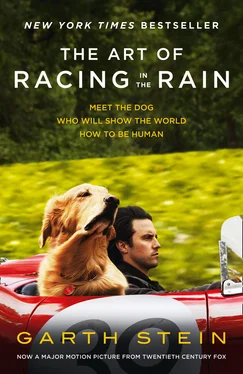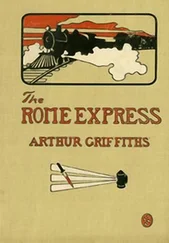It is my opinion that the so-called dew claw, which is often snipped off a dog’s foreleg at an early age, is actually evidence of a preemergent thumb. Further, I believe that men have systematically bred the thumb out of certain lines of dog through an elaborate process called “selective breeding,” simply in order to prevent dogs from evolving into dexterous, and therefore “dangerous,” mammals .
I also believe that man’s continued domestication (if you care to use that silly euphemism) of dogs is motivated by fear: fear that dogs, left to evolve on their own, would, in fact, develop thumbs and smaller tongues, and therefore would be superior to men, who are slow and cumbersome, standing erect as they do. This is why dogs must live under the constant supervision of people, and are immediately put to death when found living on their own.
From what Denny has told me about the government and its inner workings, it is my belief that this despicable plan was hatched in a back room of none other than the White House, probably by an evil adviser to a president of questionable moral and intellectual fortitude, and probably with the correct assessment—unfortunately, made from a position of paranoia rather than of spiritual insight—that all dogs are progressively inclined regarding social issues .
Case-in-Point #2: The Werewolf
The full moon rises. The fog clings to the lowest branches of the spruce trees. The man steps out of the darkest corner of the forest and finds himself transformed into …
A monkey ?
I think not.
6
Her name was Eve, and at first I resented how she changed our lives. I resented the attention Denny paid to her small hands, her plump, round buttocks, her modest hips. The way he gazed into her soft green eyes, which peered out from under stylish strands of straight blond hair. Did I envy her engaging smile that eclipsed anything about her that might have been considered less than special? Perhaps I did. For she was a person, unlike me. She was well groomed. Unlike me. She was everything I wasn’t. I went for extended periods without a haircut or a bath, for instance; she bathed every day and had a special person do nothing else but color her hair to Denny’s liking. My nails grew too long and scratched the wood floor; she frequently attended to her nails with sticks and clippers and polishes to make sure they were the proper shape and size.
Her attention to every detail of her appearance was reflected in her personality as well: she was an incredible organizer, fastidious in nature, constantly making lists and jotting down notes of things to be done or gotten or assembled, frequently creating what she called “Honey-Do” lists for Denny and me, so that our weekends were filled with trips to the Home Depot or waiting in line at the Disposal and Recycling Transfer Station in Georgetown. I didn’t like painting rooms and fixing doorknobs and washing screens. But Denny liked it, apparently, because the more she gave him to do, the more quickly he completed his tasks so he could collect his reward, which usually included a lot of nuzzling and stroking.
Soon after she moved into our apartment, they were married in a small wedding ceremony, which I attended along with a group of their closest friends and Eve’s immediate family. Denny didn’t have any brothers or sisters to invite, and he explained his parents’ absence simply by saying that they didn’t travel well.
Eve’s parents made it clear to all involved that the house in which the wedding took place, a charming little beach cottage on Whidbey Island, was owned by close friends of theirs who were not in attendance. I was allowed to participate only under strict rules: I was not to roam freely on the beach or swim in the bay, as I might track sand onto the expensive mahogany floors. And I was forced to urinate and defecate in a very specific location next to the recycling containers.
Upon our return from Whidbey, I noticed that Eve moved through our apartment with a greater sense of authorship, and was much bolder in her actions to move or replace things: towels, linens, and even furniture. She had entered our lives and changed everything around. And yet, while I was unhappy with her intrusion, there was something about her that prevented me from mustering any real anger. I believe that thing was her swollen belly.
There was something about the effort it took for her to lie down on her side to rest, having removed her shirt and undergarments, the way her breasts fell just so across her chest as she lay on the bed. It reminded me of my own mother at mealtime when she sighed and shrugged herself to the ground, lifting her leg to expose her nipples to us. These are the devices I use to feed you. Now eat! And while I greatly resented the attention Eve lavished on her unborn baby, in retrospect, I realize I had never given her a reason to lavish that same attention on me. Perhaps that is my regret: I loved how she was when she was pregnant, and yet I knew I could never be the source of her affection in that way because I could never be her child.
She devoted herself to the baby before it was even born. She touched it regularly through her tightly stretched skin. She sang to it and danced with it to music she played on the stereo. She learned to make it move around by drinking orange juice, which she did frequently, explaining to me that the health magazines demanded she drink the juice for the folic acid, but she and I both knew she was doing it for the kick. She once asked if I wanted to know what it felt like, and I did, so she held my face against her belly after she had drunk the acid, and I felt it move. An elbow, I think, pushing out perversely, like something reaching out from the grave. It was hard for me to imagine exactly what was going on behind the curtain, inside Eve’s magic sack where the little rabbit was being assembled. But I knew that what was inside of her was separate from her, and had a will of its own and moved when it wanted to—or when prodded by the acid—and was beyond her control.
I admire the female sex. The life makers. It must be amazing to have a body that can carry an entire creature inside. (I mean, other than a tapeworm, which I’ve had. That doesn’t count as another life, really. That’s a parasite and should never have been there in the first place.) The life that Eve had inside her was something she had made. She and Denny had made it together. I wished, at the time, that the baby would look like me.
I remember the day the baby arrived. I had just reached adulthood—two years by calendar count. Denny was in Daytona, Florida, for the drive of his career. He had spent the entire year soliciting sponsors, begging, pleading, hustling, until he got lucky and found the right person in the right hotel lobby to say, “You’ve got balls, son. Call me tomorrow.” Thus, he found his long-sought sponsor dollars and was able to buy a seat in a Porsche 993 Cup Car for the Rolex 24 Hours of Daytona.
Endurance racing is not for the meek. Four drivers each spending six hours behind the wheel of a loud, powerful, challenging, and expensive race car is an exercise in coordination and determination. The 24 Hours of Daytona, which is broadcast on television, is as unpredictable as it is exciting. That Denny was presented with a chance to drive it in the same year that his daughter would be born was one of those coincidences that turn on interpretation: Eve was dismayed by the unfortunate timing of the events; Denny celebrated the bounty of opportunity and the feeling that he had everything he could possibly ask for.
Still, the timing was off. On the day of the race, even though it was more than a week before schedule, Eve felt the contractions and called the midwives, who invaded our home and quickly took charge. Later that evening, as Denny was, no doubt, driving the circuit in Daytona and winning the race, Eve stood bent over the bed with two round ladies who helped her by holding her arms, and with a monstrous bellow that seemed to last an hour, squirted out a little bloody blob of human tissue that wriggled spastically and then cried out. The ladies helped Eve into her bed and rested the tiny purple thing on her torso until the baby’s searching mouth found Eve’s nipple and began to suck.
Читать дальше











![Hubert Bancroft - The Native Races [of the Pacific states], Volume 5, Primitive History](/books/749157/hubert-bancroft-the-native-races-of-the-pacific-s-thumb.webp)
![Hubert Bancroft - The Native Races [of the Pacific states], Volume 1, Wild Tribes](/books/750126/hubert-bancroft-the-native-races-of-the-pacific-s-thumb.webp)